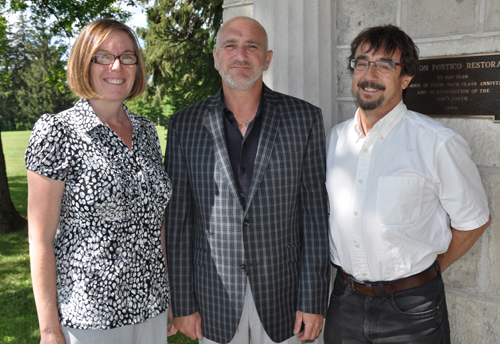
Don’t let its new name fool you into thinking that the Centre for Open Learning and Educational Support is the new kid on campus. Starting in September, two U of G departments that have been around for close to 20 years – the Office of Open Learning (OOL) and Teaching Support Services (TSS), will merge.
The two departments decided last fall to combine their strengths and create a streamlined organization that can serve the University’s educational needs more effectively.
“We’re the place to come for anything related to teaching, and we also directly support learning in a multitude of ways,” says director Peter Wolf, who describes OOL and TSS as “two strong, healthy departments at or near our peak. This gives us a strong foundation to build on.”
Reducing overlap between the two departments was one of the driving forces behind the merger, he adds. “For example, it used to be that for distance education we would use one learning management system while on campus we were using a different one. Now, we are using the same system and can support students, faculty and other educators more comprehensively with the same look, feel and range of available educational technologies. We can be more effective and efficient.”
The staff in both departments share similar and complementary skills and expertise, which makes it possible to work together towards enhancing the centre’s capability to serve the community. “By merging, we can increase our capacity to provide a broader range of services,” says Wolf.
The Centre for Open Learning and Educational Support will assist faculty and other educators across the University as they evolve their teaching and learning expertise. This includes support for distance and on-campus course design, curriculum-related course design, course delivery and assessment, as well as developmental opportunities. Graduate students can also find support for teaching, learning and navigating the professorial path.
The centre also expands learning opportunities by providing quality continuing and distance education programs and building connections between the University and the broader community. The centre directly supports open learning and continuing education learners through academic advising, registration and ongoing assistance.
As an organization that networks with every college, most units on campus and external partners, Centre for Open Learning and Educational Support can help bridge the gap between faculty and other educators working on related projects in different areas. A college that wants to create a new certificate program, for example, might benefit from partnering with another college that offers relevant courses.
“We need to know what the colleges are doing in different areas,” says associate director Richard Gorrie, adding that this knowledge can help foster important connections.
Building bridges also extends beyond the campus to the broader community. The Centre for Open Learning and Educational Support helps businesses develop training programs by pairing them with faculty in related areas of expertise. The centre also keeps an eye out for opportunities to develop industry partnerships and provide up-to-date training programs for professionals.
“Externally, OOL was regarded as a leader in the development and delivery of non-degree professional development and academic programs, courses and conferences,” says associate director Michelle Fach. “The Centre for Open Learning and Educational Support will continue to extend the teaching and research expertise of the University to local, national and international students.”
Another example of external relationship-building was a recent visit by researchers from the Chinese Academy of Agricultural Sciences. The delegates arrived in May and spent three months at Guelph, where they developed their English presentation skills and created research partnerships with U of G faculty in similar fields.
“We now have an opportunity to explore other avenues that further open the learning opportunities available, based on the vast and deep research and teaching expertise at the University of Guelph,” says Wolf. Examples include new open learning program certificates, personal interest events and other forms of community engagement.
Learning is an ongoing process, even within The Centre for Open Learning and Educational Support. “We continue to explore ways to engage faculty and other educators, students and our communities,” he adds. “We are now better equipped to meet the current and future needs and opportunities in the changing landscape of higher, open and continuing education at the University of Guelph.”
Visit the Centre for Open Learning and Educational Support website for more information.